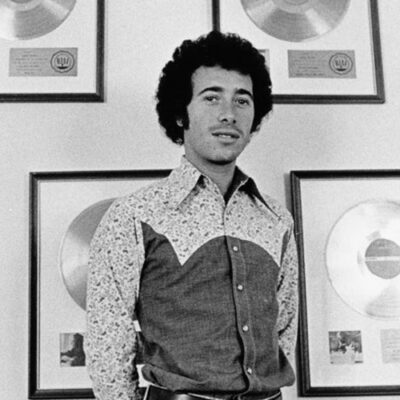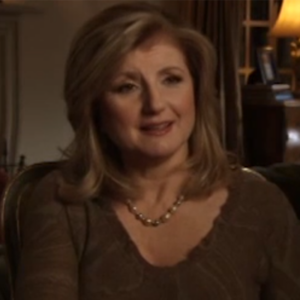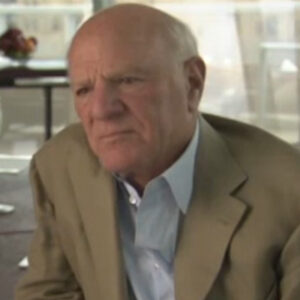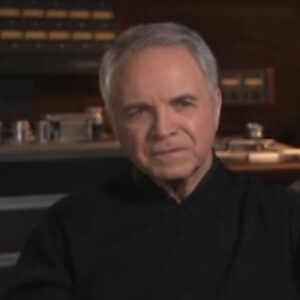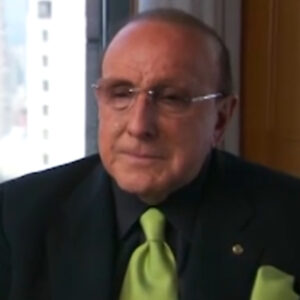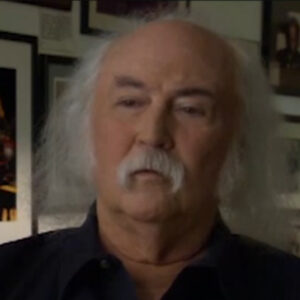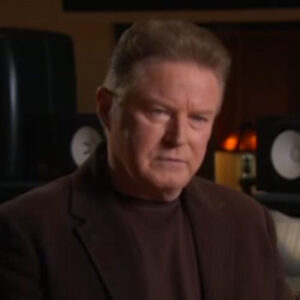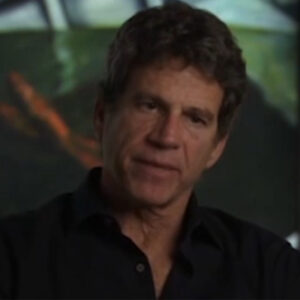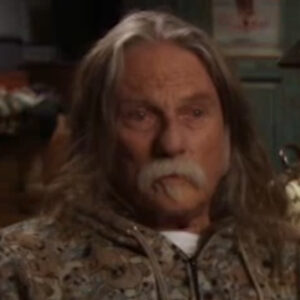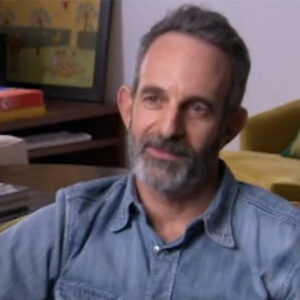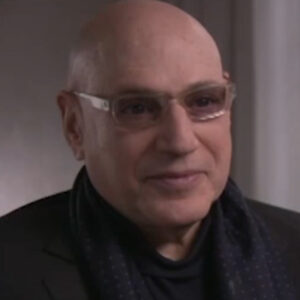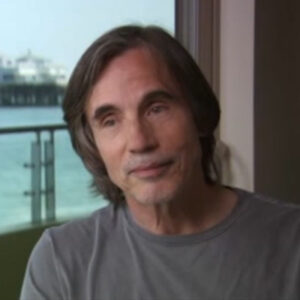Speaker OK, so we’re ready. Roosen. So just tell me when you first met David.
Speaker David and I met late 70s, early 80s.
Speaker Around the time that Michael Bennett was thinking about doing Dreamgirls and Dreamgirls was actually well on its way. Dreamgirls was in workshop.
Speaker And Michael told me that David Geffen was interested in being part of the production team.
Speaker And how did you remember him? Like, oh, David.
Speaker You know, that’s a good question. I was thinking of that reason. I would have. I’m not sure how David and Michael first met.
Speaker I think it was. I knew David a little. A little bit. He asked me that. I know, David. I did. I’m not sure I actually made the introduction. I think David may have just done it on his own and may have done it actually through the Shubert’s because the Shubert’s had already decided to be a producer.
Speaker Michael wanted them to be a producer of Dreamgirls. And David no doubt went through the Shubert’s at some point to get to Michael. But who actually made the first introduction? I’m not really sure.
Speaker So you first encountered him at a workshop thing?
Speaker Well, we David and I first really started to talk about doing business on the show after the first run through was wasn’t even a workshop, was kind of a reading of the show because like Michael Bennett went through so many preliminary versions of doing something before he actually even went into a workshop. And there was there were a few readings. And I think David came in one of the later readings before the workshop even started.
Speaker David. David, love the show from the beginning, but I think what David loved even more than the show was Michael, because he saw in Michael something that everyone who got to know Michael saw, which was a totally unique, creative being.
Speaker And David was such an incredibly smart, I think, identifier of talent. And I think he was totally fascinated with Michael as a creative being. He loved the idea of the show, too, of course. And one of the reasons Michael, I think, thought it was a great mix was because the theme, the the subject matter was the music business. And that was what David was about. So it was this immediate connection, both in terms of the material, but also who these guys were. They were really kindred spirits. And that’s, I think, more than anything else. Why? David wanted to get involved.
Speaker That’s probably true.
Speaker Just going back a little bit so we can have some kind who might wise at this point. Thank you. Michael Bennett, could you describe him a little bit? Physically, he was.
Speaker And what about where he was physically? Look at David Geffen. Michael was short. He was about five, five, two, three. He was slender. He was a dancer. And he was a gypsy. Michael Bennett was started as a dancer on Broadway. And it was in West Side Story originally and became very quickly when he came into the community as a as a director, a sort of wunderkind, again, as David was in business. Michael was funded immediately. People just realized that this guy was was going to do something fantastic. And he just developed his his work during the 70s, worked very hard as a choreographer and then as a director, worked on Stephen Sondheim shows Follies Company. That’s how Prince. And then he broke off. And then Michael did his really first big independent project, something called A Chorus Line, which, of course, I don’t have to tell you anyone about. It was revolutionary in so many ways. Yeah, that was great.
Speaker So I just want to go back because I think we may have the view might have gone in the middle of your description of what I’m talking about, who Michael was.
Speaker Oh, okay. Yes, of course.
Speaker Yeah. And that was 1975 76 that opened Michael Bennett from the minute that show opened. In some ways was one of the most important entertainment figures in the world. He was on the front page of Variety, having made more money in Chorus Line than just about anybody even in Hollywood. It was this extraordinary situation. Companies all over the world and Michael directed and choreographed. And he was sort of sought after by everyone. He went to Universal, made a three picture deal, plus chorus line.
Speaker And within nine months, left, literally left a note on his desk saying gone fishing. I left, got out. He was not. He hated Hollywood. He hated the system. He hated this new studio system. He wasn’t who he was. He was a gypsy who was a dancer. He wanted to work on Broadway. And then he came back to New York. We bought a building on 19th Street and Broadway, hit 90 Broadway, which for him was going to be his own little Marin County.
Speaker You know, Lucas studio. Nothing but Broadway dancers and designers and directors, whatever. And he he started to do that. And then, of course, flash forward, you know, nineteen eighty four or five. He gets eight, he dies.
Speaker But after a chorus line opened in 75 and 76, rather, and he kept going, working all over the world on the show. He had to find another show. He did another show called Ballroom wasn’t successful, but his show after ballroom was Dreamgirls. So when Michael and David met, Michael was at the top of his profession. He was the guy everybody wanted to go to. Not only on Broadway, but elsewhere. But because he had left Hollywood and written that off, he wasn’t interested in anything else. And so, you know, David, David was not what David is today or what he was even 10 years ago. But David was a pretty impressive character at that point. He was like, are you?
Speaker Cheers. Well, let me worry about that.
Speaker I’ll try to be I try not to know if it is a little hard, but I want to be like that.
Speaker I think I did one thing. So just going back for one second.
Speaker Yeah. David, those at the David.
Speaker Almost certainly was aware that it wasn’t just Michael, but it was on everyone’s lips in the entertainment industry.
Speaker Since David, since David knows everybody, anyone would certainly know Michael that it had to be way on his you know, I got to know this guy list.
Speaker Absolutely. Because Michael was at the very top of the profession and he was after a long line of, you know, Jerry Robbins and all the great director choreographers. Michael is now it the go to guy for everything, whether or not you wanted a new show or you wanted him to help on a show. So when these two guys met, it was, you know, to, you know, to novas about to burst together on on a on a new show, which was it was exciting to see the two of them click because they were so as I said, they were sort of kindred and in so many different ways. And I, I, I felt lucky to just watch it happen because I really enjoyed the two of them. Enormously.
Speaker Did you have a sense I mean, this was the first show David had investigated?
Speaker No, he had. He had invested in cats, but that was all, of course. One of my same cats murdering cats was. Hold it. Hold it after.
Speaker I’m sure this was the first show.
Speaker Yeah. Nineteen eighty, eighty, eighty one cats was after it. I’m. Yeah. Okay.
Speaker I was that was, that was was book was after Dreamgirls was very close. Maybe 83.
Speaker Yeah. OK. So then then this was his first. Yeah. This must have been his first Broadway show. Well you check your facts only make sure.
Speaker So yes. This was, this was his first show recently. Okay. Yeah. I mean it’s two. It’s terrible how 30 you slept if you could. I can remember when I was born when I read the.
Speaker Yeah, I know. Hey, this is this for that Dreamgirls was his first foray into the Broadway theater.
Speaker Was he. David had grown up in Brooklyn.
Speaker He had been a child of theater. I think he was doing right away from Balcones, you know, so that he could go and see the show. So this was in some ways, this was a real childhood dream come true. Do you have any sense of what did you have any idea that this was a really exciting thing for him to die?
Speaker Yeah. You know that David’s excitement about Dreamgirls was.
Speaker Emblematic of everything David was about, I thought. But I knew that looking.
Speaker I know that looking back now, because I was just beginning to really get to know David, because Dreamgirls represented, I think for him, a combination of interesting business challenges, which he had never done before on Broadway. Then in music business and wanted to get in the film business, too. And and working with an amazing artist, which David loved to do. He loved working with the artist and trying to pull out of them the best they were. And it also was great for David. And the reason he was excited about this, as far as I could see, is that he really could contribute, even though he was a neophyte. He had never done Broadway. This was a movie about the record business, the music business.
Speaker He said, OK, this this is.
Speaker This is a musical, a play about the music business, the record business. So David could really bring expertise about that. And most important, which he really threw himself into the cast album, which turned out to be one of the most unusual cast albums ever done. He broke he broke the ceiling, broke the record, whatever it is. He broke all the rules on doing a cast out. So David knew he could bring. So it wasn’t like he was doing a revival of My Fair Lady, which already do that. Right. He was doing something that he thought was groundbreaking from a theater point of view. But that was Michael’s business. He couldn’t tell Michael what to do. But I kept the theater, although I thought he probably wanted to. Michael would let him do what he want, but when it came to the cast album, he could do something different.
Speaker And so he could really contribute something really unique, I suppose, to just be a money man and being a backer, because that would never have interested David. That was nuts. He didn’t. He didn’t need that. He needed his juices needed to flow because of the artists involved. And because of what he could contribute from a business point of view and from one of the ancillary rights. And that was the album.
Speaker So you would consider the creative person?
Speaker Oh, of course. I mean, he’s he’s creative as a businessman. And he creates, as he thinks, how to make money. He’s thinking how to make money. He creates the paths that are most interesting to him. At least that’s how I’ve observed him.
Speaker And that’s that’s what makes people like David unique and singular. You can’t you can’t do it. Do both. You can’t help but both be successful creatively in this business without having both those skills. And David brings them all the time.
Speaker I was going to ask you, I was completely right. Oh, so we’re still waiting on the futures. Oh, okay. I have one question. Question.
Speaker So, I mean, David. He asked for money in shop shop. Right. With along with the Shubert’s, I guess sort of with my organization. I mean, do you see. I mean, was he a producer or was he just like a backer? I mean, what’s the difference? Was he. Did he actually.
Speaker Here I go. OK. He was he was a producer. He wasn’t just a back or Bakker’s just obviously put up money and they show up opening night and they have no rights whatsoever. The producers of Dreamgirls was a true partnership of people who had the right to make the decisions. They weren’t just limited money people. And that was the Shubert’s first and foremost, David, with them. But but clearly learning the ropes when it came to the theater, because that wasn’t something he he knew much about. He wanted to learn. And I think it was Metromedia was another partner. But major media, though a partner, was mostly another money source for the for the Shubert’s. And of course, Michael was a co producer. But when it came to Michael Bennett after Chorus Line, to be totally honest with you, it was his show. No one really was going to tell Michael how to move the cast out of Dan’s act. This they were vocal about what they thought they wanted in terms of producing and the Shubert’s. And David certainly were vocal about that. And we certainly talked to Michael about what they thought. But no one presumed really to interfere creatively that much with Michael was doing. But but in terms of producing this, so many other things you have to do marketing and deciding the ad campaign, the images doing the ancillary rights, the merchandising, the cast out on, as I said, and David was involved in every one of those decisions. And Michael saw his his participation. Michael was extremely close to the Shubert’s. Nobody was close to the Shubert’s of Michael. But the Shubert’s were run by Bernie Jacobson and Jerry Seinfeld, two lawyers who were absolutely devoted to Michael in every way. But they were who they who they they were good lawyers. They were mostly businessmen. David was both. David was not going to be sitting behind a desk. David was at Michael’s apartment. And like Michael, you know, and drinking with Michael and talking about Michael and really being a face not only a partner, but somebody who supported him as as an artist individually. And that that was great for Michael. Michael didn’t have a lot of those kinds of people in his life. David was. Was rare. A rare partner in that respect for Michael.
Speaker Michael, David.
Speaker David brought enormous amount to this show, an enormous amount to Michael’s understanding of how you added value to a Broadway show with the music. He also brought to Mike. Michael got to know David very well during this, and he got to know what it was like to be a real businessman. Michael would have loved to have been more of a David Geffen in terms of how smart he was and how how you make money. But Michael was much too much of a creative being to spend up too much time doing that. One of the great things that David introduced Michael to was artwork and Hockney’s. That was when David decision David was amassing his his his art collection. Yeah. I don’t remember which one he gave. David gave Michael a but he also encouraged Michael to invest in artwork, which Michael did to some degree, not to a lot, because he really didn’t understand it.
Speaker But David, because David David looked at Michael and said, you know, you’re making all this money, you’ve got to make more money. Michael was not about money. I mean, that’s one of the huge differences between Michael and David. Nothing. I’m not saying today was an essay about money, but they would like to amass money and did like nobody else during that period. Michael was Michael once said to me.
Speaker I know you’re talking about Michael, but Michael once said to me, I’ll do my best work when I don’t have money, because when I don’t have money, I know I need to make money to survive when I have all this money. The creative impetus is very different. David? I think different from that. I mean, I think the more David could accumulate, the more he could see. You could make more that drove him. So those that made it very different were different animals when it came to that.
Speaker Talk a little bit about. David’s presence, you know. I mean, he was, what, energetic? He was talkative. What way? I mean, what was your general impression of his presence?
Speaker You know, David.
Speaker Was very similar to a number of people during that era. We’re talking about, you know, the late 70s, the 80s, the kind of person David is still his.
Speaker Particularly was then was this unbelievable added almost out of control dynamo when he walked into a room that dominated it all dominated in terms of ideas dominated. That’s the spirit of what the conversation was, where the conversation went. He was a leader among leaders. Even when you had other people narrowings with Michael Bennett, he sort of ran the conversations when it was other important people in the business. He he was incapable of sitting back and sort of passively taking it in, maybe to a fault sometimes because his view of life and his view of what you think should be done really had to be what you did. He wasn’t all that interested. And no other people’s points of view. But that’s OK, because most times and that’s what you really need to make sure of. Most times he was right. He had.
Speaker And there was I don’t mean by that period of time, there were individual creative entrepreneurs who did it themselves, who independently resourceful and didn’t were not dependent on a board of directors or shareholders. And they had that independence to walk into a room with an artist and to dominate. And whether they were right or wrong, that’s what they did. And we don’t have as many of those kinds of entrepreneurs today, particularly in the record business, in the music business. This was very, very almost peculiar to the record. I don’t know why the music business. Maybe it’s because there were a lot more individual entrepreneurs there. But he did the same, of course, when he did movies. And and as I said, Dreamgirls, his first play, he had to defer to the expertise of the Shubert’s Michael. But he was OK doing that because he recognized that this wasn’t an area. He had great expertise. That doesn’t mean that when he walked into a room and there was an issue at stake, he had to make it well known what he thought was the right way to go. But he he exuded that thing that that successful people in the entertainment business who who just understand immediately the personalities, the spirit of the room, the bias of people in the room, every he went right to the heart of who people were. And he always understood that and could take advantage of that timidity. No, I never saw that. I mean, but I thought it was a great quality, but always took for example, I mean, he he knew what he needed to to be successful. And since I represented him many times in stuff that he did in the theater and some of respects, he was incredibly deferential. When he wanted me to do something, he’d say, well, you know how to do this. Just do it for me. Just do it. So if he trusted you and he knew you knew what you were doing, he completely delegated that out to you, at least those those things that he realized completely. But he had the confidence of people he knew around him that he trusted. And it’s this it’s this amazing ability to understand people from the get go. And of course, if if he didn’t understand someone who didn’t like someone, there was no point in continuing having a relationship. But if he liked you and thought you would help him and be good for him in some respect, of course, in his world, that was that was very important to him.
Speaker See that dark side of David O.
Speaker David Gergen? He knows. I mean, I never I was never the brunt of it. I’m very happy to say I just just because I wasn’t.
Speaker But when David was unhappy, everybody was unhappy.
Speaker When David was angry, you really had to clear the path and get away because he he did not suffer anybody pool fools or certainly anybody who was not going to stand in the way of doing what he wanted it to happen.
Speaker So can you think of anything that happened on the show that be a good example of something where he said this is just you wouldn’t put up with it? Or is there anything about me, believe me?
Speaker Yeah. Yeah. No, I. Yeah. Because you want specifics.
Speaker Well.
Speaker It wasn’t. I never I never saw David lose it on Dreamgirls. I never did. It was a very positive experience from the beginning, Dreamgirls. But he he did lose it, for example, on another show and butterfly that he produced. And there he had a incredibly bad run in with his co producer, Stuart Ostro. And that was not a happy event. And David, you know, pulled no punches. He was unhappy the way the show was produced after it opened on Broadway. And the way it was going to be done on the road. And it was it was not pretty.
Speaker And David Stewart became a David Geffen enemy. And you don’t want to be David’s enemy, because when he knows he’s right and thinks he’s right and you think somebody else has done something that hasn’t been good for him, he he will he will be is as tough as anybody.
Speaker I mean, do you think that is it? Is it. I just noticed that there is a pattern to what sets him off.
Speaker I mean, I think a lot of times it’s about. Loyalty.
Speaker I don’t know if that was the case with Stewart, but. He doesn’t like you, so he doesn’t he thinks somebody is trying to either pull a fast one on and do something without his knowledge going around him or being disloyal. Are the things that really if someone makes a mistake and they’re honest about it and they say, look, this was a bad idea, I thought it was a great idea.
Speaker Right.
Speaker In the case of Butterfly, it was simply, I think, David’s anger at his partner doing bad business. He didn’t like the business that was going on. He didn’t think that that was necessarily nefarious, but that it was just bad judgments. And and he wasn’t listening to him. Stewart wasn’t listening to David. And David wants people also listen to him, especially when he has a place and it’s supposed to be listened to. So if you go up against him and David believes that maybe that’s disloyalty, I don’t know whether that’s disloyalty or not. But I would say it’s just David’s inability to accept the behavior of someone who is standing in the way it always does.
Speaker I think standing away with David thinks is right for for him, for his business. And I you know, I don’t think it’s it’s not really personal with David, but it started it maybe gets personal because it is always individuals involved ultimately. But it starts with you standing the way of what David thinks is best for his business, whether he’s right or wrong. If David thinks that’s the case, then that will set him off when when he he meets that adversary.
Speaker Let’s just go back to Dreamforce for a second. As a producer, can you think of any specific things that David brought to the table that were great ideas that were revelations that changed the direction?
Speaker It was the album, the cast out. The Cast album is really what David focused on, because up until that point, every show did a cast. But David decided that since this was about the music business and the songs could be possibly cover songs, cover records and popular standards.
Speaker David persuaded Michael to, first of all, hire a producer that had never been never done a Broadway album. David Foster, one of the great, great producers of all time, and he was one of the best producers then, too. And now, of course, he’s a legend. And so David persuaded Michael to bring David Foster in. And other people have said, well, you know, we’ve never heard of David Foster, who has to do with the cast album.
Speaker He does rock albums. OK. David convinced Michael he needed a rock producer. And then the other thing David did, which never done before, was that every cast album since, you know, 19, 30 or whatever, you did the album in Syria, Adam, you know, the beginning, the overture in the first song, the second sort of the third song. And that’s what people want. They want to see the show sort of through the album, Audie. You know, from from an audio point of view, David said no. He said that’s not the way we do this album. We would do it like a rock album where you create and you produce the sounds in sequence to what is best to listen to. So if in the show you have three ballads, I’m not going to do that on the album. I’m going to mix it up with a jazz number or not number and whatever, because I want the listener not necessarily to have to follow the story, just listen to the music like any other rock album. So those are two in that time, things that would never, never done before.
Speaker The other thing that was never done before, there was more money spent on that album than any thing. There was more spent on an album and some shows.
Speaker It went on forever. I mean, most albums are done in 24 hours. You have to do it in 24 hours because the cast gets paid a week’s salary for every session that they take.
Speaker This thing went on for ever.
Speaker Was the most expensive special cast that were ever done. But it was pretty spectacular and it made history. And people rethought from that day forward how to do cast albums, how to market them. And David, of course, who was on the Geffen label, David marketed it not as a cast album, but as both a cast iron man and a rock album. And and that was that was really David’s biggest contribution, because when it came to the show, David would like the Schubas and others obviously sit down with Michael and say maybe this, you know, what about this? What about that? But Michael was in charge that. David, defer to that, I’m not sure. David probably has ever, in his life deferred on any other project like he did on Dreamgirls because he entrusted it with Michael. And Michael really pretty much did what he was doing. But but as I say, David had a right. David had a right of first refusal to do the movie, but he had not acquired the movie rights from the beginning.
Speaker After Michael died in 1987, a year or so later, David called me and said, I want to make Dreamgirls into a movie. And that was great.
Speaker And Michael, I know, would would have loved David to do it. And it’s the only person who should do it. Other people had wanted to do Dreamgirls, but as soon as they found out, called me up, I had a lot of calls and I said, well, David has a right to first refusal gone over they got because they knew they could never go off against David.
Speaker He would do whatever he could to hold onto it and he should. He invested in the show originally and believed in it.
Speaker So he acquired them in the late 80s and didn’t make it until two thousand, three, four. But when did think in 2005 he mounted camera four when it’s no fun at some point.
Speaker You might set this up, in other words, you want to say, then it’s all understood.
Speaker Oh, yes.
Speaker I just witnessed the throw you say Michael Bennett as opposed to Michael Orbanes. I keep saying Michael. Not having done just this documentary about Chorus Line. Everybody knows all about Michael. OK. So I’ll say occasionally.
Speaker OK. So he tried to save Michael. Diana was Michael. So anyway, he. Yeah. So. And so it took him to finally make it from whatever it was, 1989 to 2004 to come on time because he wasn’t he. He was determined to cast the show. With the right. Singers and movie people and stars. That would make the show work at the box office. You need all those lines. But if I say so, it’s OK.
Speaker Do it again. He was determined that David was determined to cast the show.
Speaker They’re determined to cast the film. Yeah, yeah.
Speaker David was determined to cast the movie with stars, but stars who could do service to the music, which is very difficult to say, and who were drawn from the film world and the music world and needed to make sure that that casting profile was right to do the movie from a commercial point of view.
Speaker Let’s keep in mind, still an African-American show into a movie and you had to make sure you had the right demographics, that the business of doing African American films has changed dramatically from 1980 to 2004. Huge difference. A much bigger audience, much more crossover.
Speaker And so I think as the years went by, David kept looking at the film in the context of what could Hollywood absorb, what it would do, what it could sell.
Speaker And he went through really a process of trying to first identify who was going to play Deena the star, the star who becomes, you know, world famous singer, and Effie, who, of course, is the powerhouse woman, gets thrown now. So he had to find those stars first unless he found those people. He wasn’t even going to think about anything else, including directors or anyone, because it was all about those people. And those those two women had to be fabulous singers, had to be fantastic singers. It turned out he he went he went through the roof with Beyonce, say, and and Jennifer Hudson, you know, one day those two women at this point of their careers did not exist in the firmament. And then in the black star firmament and all those years, it just didn’t as far as David was concerned. I think it was right. A. And then, yeah, he had I mean, David had to wait until he could identify that kind of power. And when it came to the talent and when he found it, that’s when that’s when he did it. One of the great things about David is that he had acquired these rights in nineteen eighty thereabouts. And I’m sorry, Sir David acquired these rights. Michael died in 1987. I hope these dates are David acquire these rights at the end of the 80s 90.
Speaker And he kept these rights for almost fifteen years before he released the movie. Most producers can’t afford to do that. He paid a substantial amount of money to the authors of Dreamgirls. He sat on those rights. He sat on that investment. That is not a common event.
Speaker And I was delighted that I could sell the rights to David because if I sold them to a studio, normally the studio would just want to get going with it because they want to make the movie and turn over the investment and get going. And that’s what most producers want. They want their fees. They want to move on. David didn’t need to do that. The producer has the answer. But he he he owned these rights himself. David O. David acquired these rights individually, his company. He owned this. Right. He had no studio. He was beholden to no one. So he could hold on to these rights forever or never make the movie. He said this to me on occasion. That David said to me, John, if I never make the movie, it’s fine. I’ll only make the movie when I believe I’ve got the right elements. And the first thing I need to do is if I can cast this. And then, of course, he needed the right director and everything else that a producer does, because it was it was a very special part of his life. Dreamgirls. He was a first show he ever did. And it was he was the first time he worked with Michael. I think people use the term a lot. He loved Michael, I think. But I think they did have an enormous affection for each other. And he was devastated by Michael dying, losing Michael, as we all did. This is huge. Michael Bennett died at 44 years old. Forty four. He was a baby. And that was hard on David. And that’s when he bought the movie rights. I think he bought it to make sure also that no one else would screw it up. He wanted to make sure that if it was ever if it was ever done, it was then the right way. He cared deeply about this was this was a project that, you know, was part of his develop growing up. You know, there was a young boy that had all of us and we all were young boys and, you know, and so this was a really an important part of his. I mean, I think I’d be very surprised if David did not consider this to be an important project from a not because it made a lot of money. Dreamgirls did not make that much money. Neither the the show nor the movie.
Speaker You know, some some, you know, blockbuster Titanic movie. But I think David’s was incredibly proud of the movie he had. When I saw the movie, I saw three screenings. I was stunned when I saw the first one because I never really thought you could really pull it off. It’s a very tough musical to do as a movie. Of course, so much has to do with Bill Condon. The screenplay in that bill did a spectacular job. But there’s a lot of David in that, too. A lot of David in that movie. He you know, his hand was all over it. So he achieved what he wanted to. He did something that he loved. He did something that Michael, I think, would have been very proud of and been happy with for Michael.
Speaker Yeah. I think it was part of the part of him doing it was Michael’s legacy. But like everything else, David does. He did it for business purposes to. He did. He said, you know, he he didn’t go off and do something as some kind of ego trip.
Speaker And and he you know, it was done on budget, done on a budget. It wasn’t a 150 million dollar movie. But I think David felt strongly about the project and about during girls, I think because it came at a partner’s life where it introduced to a whole new part of the entertainment business. And it was an emotional attachment to who Michael was. And Michael’s memory.
Speaker Michael Bennett’s memory. We’ll talk a little bit more about Michael. I’m going to go back to the show opened and David was green guardsmen opened.
Speaker Yeah, yeah, yeah.
Speaker Dreamgirls opened to probably the one of the top five notices that Frank Rich ever wrote in his life in terms of a rave review. Some might say it was the best review ever wrote. But I’ll say the top five for sure. If you if anyone can go back and read Frank Rich’s compendium, I think he did. Well, the famous one is the torch. The torch has now passed. Michael announced to the theater curator to the world were Frank Rich announced his theater community, The World that the torch of the great director choreographer Jerome Robbins.
Speaker The West Side Story. Countless others. The roof. The torch not passed to Michael Bennett is really a very dramatic statement because it put an encapsulated so much of the history of Broadway. It in one sentence sort of capped and crowned Michael as the the genius successor to the genius mentor. Jerome Robbins. Remember, Michael Bennett was his first show was West Side Story. So Jerome Robbins was this for him, an icon.
Speaker So it was it was it was historic review because it had this sense of the passing of time and the passing of the torch. The other thing about the review, which Frank talked about, which was like nothing before him. David David loved was the fact that Frank recognized the sense of the cinematic approach of a Cawood during girls presented. They had never been a show quite like this before, which really unfolds in front of you like a film. It never stops. There’s never a blackout. There’s never a scene change. Everything is done effectively on a bare stage with five tower. Is it all in perspective?
Speaker And David loved that because David loved being part of what was really a groundbreaking show. So, Frank, those are the two things Frank recognized the sense of of of not only history, of what was happening because of the success of the show.
Speaker The sad thing, oh, you have. Oh, good.
Speaker So this the fact, though, is that Dreamgirls got a lot of bad reviews. The show Franck’s was over the moon. And Frank, at that time, The New York Times had more power than any any other paper. And in the theater business, as opposed to the music business or the movie business, the power of the press. And the critics particularly. Then it changed a lot. Now was monumental. It’s the other notices. Many of them noted noses were not good. And Michael was devastated by that. I mean, devastated because he had poured his heart and soul into it. And David, again, like like like the Shubert’s in minute. The producers were there for Michael. They supported him. They said, this is this is a great show. We’re going to support it. We support it. Keep it going. And we will support whatever it needs in terms of marketing and advertising. He then went off and did the album, as I said, and even in the face of a show that did not get universally great reviews under spending more on the album.
Speaker No, this is David Geffen’s money.
Speaker This is nobody else’s money on the album. All right. And and he he he supported Michael to the hilt because he loved the show and believed in the show. But it was rocky for the first month or two, not knowing whether or not Dreamgirls, the music or the musical, the play was really going to be successful. It turned out that it ran for over three years, made all its money back, made profits, went on the road and made money, as it turned out, to be very successful in this country. It never was produced outside this country.
Speaker It was too expensive, was too expensive. So just going forward, you have a definite Broadway producer.
Speaker You have to do with that. No, I had Dave. Dave. Yes. David on occasion would call me and ask me some advice, just off the cuff advice, as it were. Just what about this? What do you think about this? Whatever. But there really wasn’t much he needed in terms of advice from me at that point. He he made a partnership with the Shubert’s. He was getting along with Bernie Jacobs, who ran that organization at that point. He Dreamgirls was a good experience. And of course, the Shubert’s were more than happy to bring David in because he could write a check as they could. He didn’t go out and have to raise money. The theater is, you know, a place that has hundreds and hundreds of producers, but many of them don’t write checks. All right. They find other people to write checks. David is a producer on the theater who writes his own check and that those are the kinds of partners that the producer that the Shubert’s would like to have. Yeah. What other shows? Well, I mentioned M. Butterfly. You’re you’re gonna have to remind me. I don’t remember. I don’t think he really did that. Many didn’t do them any. Right. Okay. I’m right about that. That’s why I can’t remember. He did. He put money on the line and then also made a movie.
Speaker Didn’t he have to do them some day? And he did. He did. Oh, he did. So he didn’t he didn’t do a lot of other shows. And actually, you know, I mean.
Speaker What David says is that.
Speaker You’re around when when?
Speaker When my uncle died, he he really sort of lost his interest.
Speaker Yeah. I think of Michael Bennett had lived.
Speaker I think whatever Michael did, more or less David would have participated in. Because he he was he he loved to Michael wasn’t as an artist, you know, unless there was some screwy, hairbrained project that Michael Bennett wouldn’t do that, you know, could because David didn’t do projects. Just to do projects. He didn’t do. There are producers there and there are producers there, producers who need to make a living. I don’t, you know, second guess that that need to. To pay the tuition and pay the rent. And they need their fees and they need their office charge.
Speaker But David never came from that that that position. He he made money so quickly and was so independent in many ways that he wanted to do things. They charged him up that get his due.
Speaker And and so, you know. And yeah, I don’t think, David, as far as I know, David did not cultivate theater people. He cultivated the music business and the movie business ultimately. Those people he wanted to do, he didn’t cultivate. You have to be doing they have to be in the business, going to offer a way shows and Broadway shows and knowing the directors. And there. And there was you know, today there’s much more cross-fertilization between writers and directors in the movie business and the theater business. There wasn’t that much more segregated then. So it was David’s world. And it wasn’t he. He would say to me, he said, you can’t make money in the theater. I don’t either. Occasionally things would come by. And because he’d invested and produced Dreamgirls and and and Butterfly and Cats, he was on everyone’s list. You know, how do you get to David Geffen? And I would get calls occasionally from people saying, can you get to David for me? I have this great play of this great musical. And I’d call him up. And inevitably he would say, John, I am too busy and I don’t really have that much interest in it and you can’t really make money in the theater.
Speaker So it’s really the artist.
Speaker And I think also making money, you can make a lot more money quicker than the businesses, Michael. The businesses that David went into as opposed to the theater.
Speaker It’s just it’s it wasn’t that much of a charge from if he did if he wasn’t if if he wasn’t taken with the artist, then at least he has to be taken with being able to make a fair amount of money. And that’s usually not the case on Broadway. There are occasional huge hits, but they’re few and far between. One every 10 years.
Speaker So.
Speaker So what happened?
Speaker I got quite sick, Michael. Michael Bennet. Found out he had AIDS around nineteen eighty five and late 84. He Michael was doing was planning to do chess as a musical with ABBA.
Speaker And I’m I’m fairly certain if he did that, by the way, David Geffen would have wanted to be involved because it was another show that was David Geffen would have wanted to do the show with Michael because it was Avant who is the rock world.
Speaker And Michael loved the score.
Speaker And he developed the show and he went over to London and he was having auditions and some preliminary work on the show at a studio where you had to climb three flights of stairs. As it happens and on the no elevators. And he called me up after a second and he said I can barely walk up three flights of stairs. Something’s wrong with me. I don’t know what it is. I came back to New York, went to the doctor, and he told us he had AIDS. And remember, this is the early stages of AIDS. And Michael was not Michael Bennett did not want anyone to know yet. So there were only a handful of people who knew. No, not the beginning. I don’t remember when he told David. I don’t remember. I do remember having a few conversations with David where I had to respect Michael’s privacy because I literally there were three or four people who do.
Speaker And you have to if you didn’t live through it, you had to realize that having AIDS then was a scourge and people were terrified to to to be with you. They didn’t want to eat with you. They were afraid that they they they kissed you, that you’d get infected. No one knew. I remember someone telling me that Lacaze Riffel, which opened a few years before then people would go to the box office and say, you know, I don’t really know if I should come or is it OK when we come in? If there are people have AIDS, if we sit in the seats or is there going to be a problem? I mean, that’s how ignorant people were of this disease. It means you can’t blame them cause there wasn’t enough evidence, enough information. So Michael did not want to be a poster child for AIDS, since there are so few people who knew who had the disease. So he kept it secret from everybody, even Bernie Jacobs, who, as I said, was very, very close to Michael.
Speaker And he it I don’t know if you want to know this.
Speaker This may be boring. I mean, it’s more about Michael. But there is a huge piece in The New York Times, front page of the arts and a huge picture. Michael Bennett in his East Hampton house, which it has, as you know, bought from from David Geffen. And it was a fantastic shot of Michael with his dog, with the pool is huge. And this was an interview he gave The New York Times while he had AIDS. And he he lied. He said it was a heart condition.
Speaker And the reporter, Jeremy Gerard, talked to you about it just went on and the whole fiction just continued. And some of us, you know, we were not happy with this fiction continuing because we knew it was going to blow up at some point. There was no way this could be kept under wraps. At this point, having AIDS was a death knell. There were no cocktails. There was nothing. You had AIDS, you died. It then broke and it it leaked. And the very reporter that Michael had interviewed at Michael and the House in East Hampton broke broke the news against policy, actually. I mean, because the New York Times policy at the time was unless the victim or the person was ill agreed to it, if the person wanted to keep his privacy, they they would respect that. And they went against it. The piece was written. Michael was very, very hurt, very angry, as we all were, because we thought that it just wasn’t right that Michael’s condition should be laid out that way. And so that was it came out. I don’t remember. I think David found out like a lot of people found out here in the press or through gossip. I don’t think I mean, you can ask David. I don’t think Michael told David. He didn’t tell anyone. I mean, if he didn’t tell Bernie Jacobs, he didn’t tell his mother.
Speaker Well, he didn’t tell anyone. David.
Speaker I mean, he talks about how. When AIDS first was on the scene in the gay community in.
Speaker Yes. Just waiting. Yes. It was it was just.
Speaker Oh, everybody. Oh, shocked. The whole community thought.
Speaker It’s just a matter of time till I get it right. Because everybody was getting. It seemed. It seemed. Michael Bennet had a sore on his his foot and he he denied it.
Speaker He was in denial.
Speaker It was you know, she had a sore on his foot and it turned out that was one of the symptoms.
Speaker You know, he had it every morning. He would get a shower and.
Speaker That’s what the unity. That’s what anyone who is certainly gay was concerned about and looking back and they are there. What they did last two, three, four months or a year or two years. What?
Speaker Well, you have to remember is that the the ignorance of everyone about it was huge. Including the medical community. And it was kind of catch up on it. You went to a doctor and you said to a doctor, what can I cannot do in the early stages? They weren’t really sure. Yeah. Can you get it from saliva?
Speaker I don’t know if you remember, but there were articles about whether it was transmitted through saliva or not. Until finally, you know, all those things were put to rest. But it was a terrified period. And of course, the theater theater community was decimated by it more than any other community, more than the film or the music business. It was decimated. And Michael Bennett was right up there with the most. Oh, everyone was tragic. So many. But losing Michael Bennett, 44 years old today, you know, he’d be 69. Imagine what you could have done in all those years.
Speaker Yes. Twenty five years. Yeah.
Speaker Well, was the long the loss the loss was is unfathomable because of Michael Bennett had done. And I think it goes to, you know, the depths of how how David felt about Michael. To lose someone like that. A friend. Mostly. Mostly because he was a friend, you know. Sure. He was a great with. Hey, I mean, Corazón, Dreamgirls. I mean, you know, about to do chess. You know, still the man everybody wanted to do their show. That was the person you wanted.
Speaker Well, David Geffen was talking about this some more. But, you know, the fact is he probably saw a lot of experience.
Speaker Of course. Yeah.
Speaker There it is right in front of you. Someone who is so much spirit, the way you move, the way you think, the way you act, the way what drives you.
Speaker All those things were so common. The two of them. It was always great watching the two of them together because it was just like, you know, Frick and Frack. It was just as I don’t remember. I mean, I’ve I’ve been in business, what, 40 years. I can’t remember two people who are so similar in the way they moved and acted and talked.
Speaker But still, we’re very different because of how they approached their business, how they approached, how to be successful. They approach that very differently. But fundamentally, they weren’t the same. The same person. Same kind of person. The same temperament and the same the same instincts. And that was fun to watch, you know.
Speaker Well, you without a David Geffen supporting and guiding and watching from the outside or the inside, a creative person, creative person’s juices will keep flowing. But those like flowing down the drain, they’ll flow, but they won’t go anywhere because. And that is true of any any of the entertainment businesses. I know countless artists for 40 years who are incredibly talented and maybe were successful and wanted to practice, would confront anything else because there was no way of channeling it. There was no channeling it. It’s very hard for a lot of artists to channel their their creative stuff. They know how to create it. But then once it comes out and it’s either on paper or it’s on film or whatever is it’s recorded. Someone needs to take hold of it and take take the artist. David was brilliant at that. And there aren’t many people in the 40 years that I could count ten or twelve, you know, who knew how to do that? David is one of those people. And they vary from someone like Michael Bennett, who’s pretty much a one man shop himself, knew that there were places where he need help and that David Geffen would be brilliant and knowing where he needed help and go in there and not interfere with the places that Michael Bennett didn’t need help. But young recording artists or young producers or young directors or whatever needed more help if you don’t have that support of a producer. You’re not going to realize your talent. And it’s so many people. I’m always amazed at how few people, laymen, as it were.
Speaker Ask the question, what is a producer? They don’t really know. Producer, as you know. And a producer is so much more than a money person, so much more than just somebody who has a credit and having put financing together. That’s very, very important.
Speaker It’s so he’s the only person on a project who has the world view, who has the big picture, who can see where the collaboration is going badly, except maybe when you have a single artist in a recording studio. And even that’s not the case because you have engineers and everybody else. But in the theater business, in the movie business, there’s no project. There’s no one of the collaboration of eight, 10, 12, 15 artists. Nobody else is looking out for the big picture. Every artist is worried about his or her own result. How does that costume look?
Speaker I don’t care about this screenplay. How does the makeup look and how does the hair look? Right. If that’s what you’re doing or how does the production design work? So a great producer has that that overview. Without that, the artists, as I said before, the artists juices will flow wherever they may flow down the gutter. So that’s what would David and so few producers know how to do. How to harness that. And sometimes there could be too strong. And sometimes you can make a mistake, but better that than someone not being around as someone who just lets the artist go loose and do what ever he or she wants without that that ultimate guide, because that doesn’t work either. Someone has to have. If you’re in the commercial business, if you’re not in the commercial business of making art, I mean, if you just sort of want to do what you want to do.
Speaker I mean, a fine artist who paints in his studio and just wants to paint whatever piece he likes and puts it out there. That’s a very pure form of art. You don’t need a producer. You need a gallery to sell or whatever you need. You know, that’s not the business that David was in or what with the film or the music or theater business was they that talent needs to be harnessed. And David is brilliant at doing that.
Speaker So let’s take a final question.
Speaker We’ve been asking everyone.
Speaker Three words to describe those questions. Um.
Speaker Three words, you give me a second.
Speaker Three words won’t give you a second.
Speaker Discard data from his.
Speaker Smart, single minded and rich.

